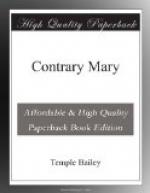A little later, the silken ladies having descended the stairway for the last time, Aunt Frances took her amber satin stateliness to the Sanctum.
Behind her, a silver shadow, came Aunt Isabelle, and bringing up the rear, General Dick, and the four young people; Leila in a pair of mismated slippers, hippity-hopping behind with Barry, and Porter assuring Mary that he knew he “hadn’t any business to butt in to a family party,” but that he was coming anyhow.
The Sanctum was the front room on the second floor. It had been the Little Mother’s room in the days when she was still with them, and now it had been turned into a retreat where the young people drifted when they wanted quiet, or where they met for consultation and advice. Except that the walnut bed and bureau had been taken out nothing had been changed, and their mother’s books were still in the low bookcases; religious books, many of them, reflecting the gentle faith of the owner. On mantel and table and walls were photographs of her children in long clothes and short, and then once more in long ones; there was Barry in wide collars and knickerbockers, and Constance and Mary in ermine caps and capes; there was Barry again in the military uniform of his preparatory school; Constance in her graduation frock, and Mary with her hair up for the first time. There was a picture of their father on porcelain in a blue velvet case, and another picture of him above the mantel in an oval frame, with one of the Little Mother’s, also in an oval frame, to flank it. In the fairness of the Little Mother one traced the fairness of Barry and Constance. But the fairness and features of the father were Mary’s.
Mary had never looked more like her father than now when, sitting under his picture, she stated her case. What she had to say she said simply. But when she had finished there was the silence of astonishment.
In a day, almost in an hour, little Mary had grown up! With Constance as the nominal head of the household, none of them had realized that it was Mary’s mind which had worked out the problems of making ends meet, and that it was Mary’s strength and industry which had supplemented Susan’s waning efforts in the care of the big house.
“I want to keep the house,” Mary repeated. “I had to talk it over to-night, Aunt Frances, because you go back to New York in the morning, and I couldn’t speak of it before to-night because I was afraid that some hint of my plan would get to Constance and she would be troubled. She’ll learn it later, but I didn’t want her to have it on her mind now. I want to stay here. I’ve always lived here, and so has Barry—and while I appreciate your plans for me to go to Nice, I don’t think it would be fair or right for me to leave Barry.”
Barry, a little embarrassed to be brought into it, said, “Oh, you needn’t mind about me——”
“But I do mind.” Mary had risen and was speaking earnestly. “I am sure you must see it, Aunt Frances. If I went with you, Barry would be left to—drift—and I shouldn’t like to think of that. Mother wouldn’t have liked it, or father.” Her voice touched an almost shrill note of protest.




